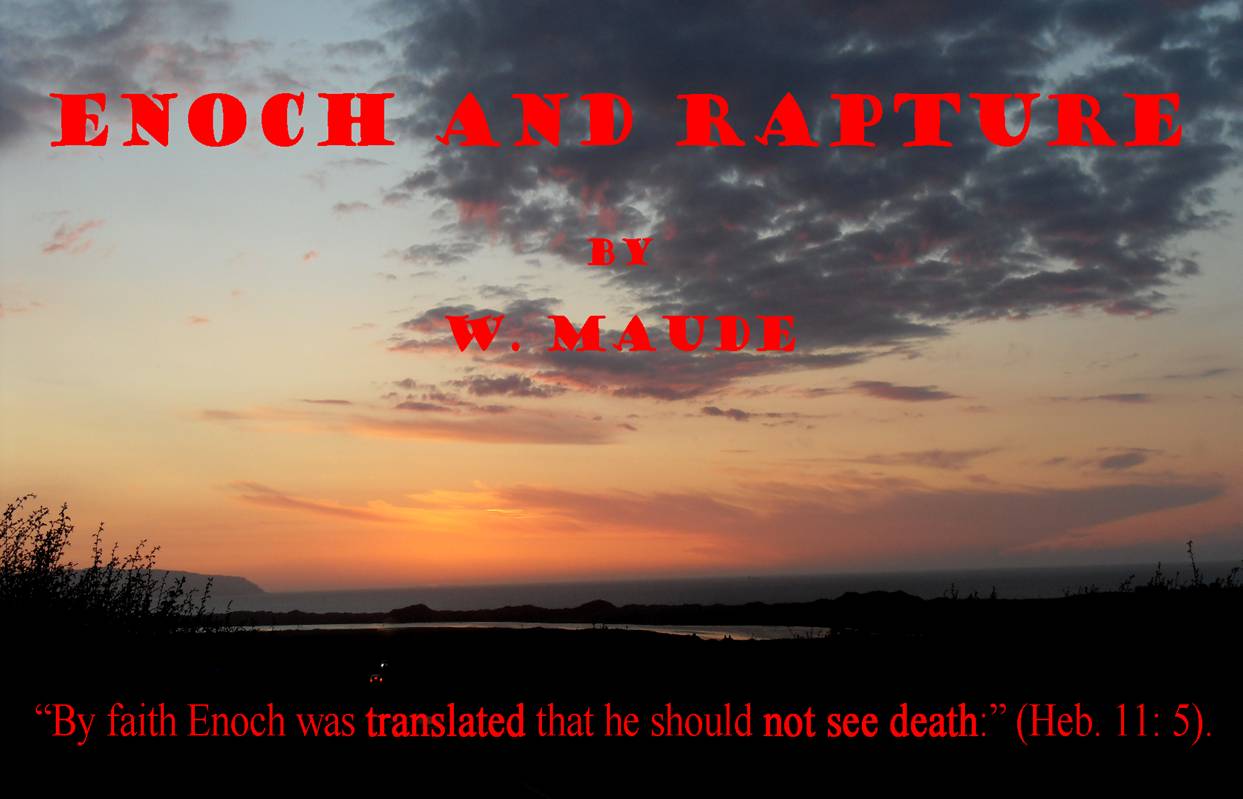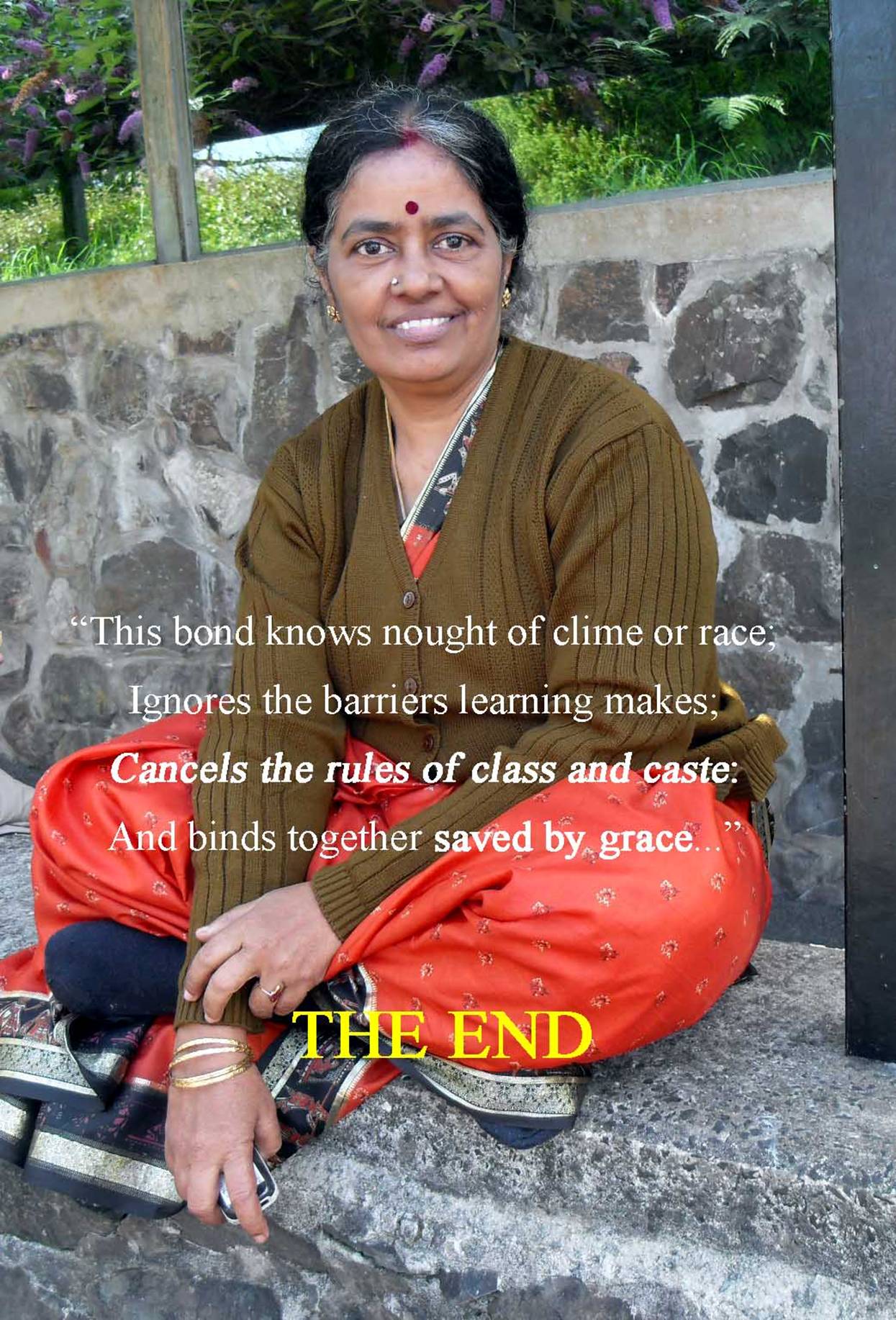
Three
texts, the only ones relating to him, clearly bring before us special aspects
of Enoch’s saintly character, namely: (1) His faith – “by faith Enoch was translated that he should not see death” (Heb. 12: 5). His walk – “Enoch walked with God; and he was not, for
God took him” (Gen. 5: 24). (3) His
testimony – “Enoch
prophesied,
saying, Behold the Lord cometh” (Jude 14). And these several points are all closely
connected. Enoch’s faith was the root
alike of his holy walk and his fearless testimony. For “without faith it is impossible” either to “please God” or
serve Him: for “he
that cometh to God must believe that He is, and that He is the rewarder of them that diligently seek
Him” (Heb. 11: 6). “And this,” says the disciple whom Jesus loved, “is the victory that
overcometh the world, even our faith” (1
John 5: 4). Gloriously, as we may see, did Enoch’s faith
overcome the world.
It overcame the love of the world,
and thus resulted in his walking with God. For “whosoever will be a friend of the world, is the enemy of God”
(James 4: 4). And, moreover, it overcame the fear of the world, else assuredly the world had
never heard his prophecy of coming judgment.
Surely it required strong faith to deliver such a testimony as his to an
ungodly and deriding generation; but this was the victory which in Enoch’s
case, as in so many others, overcame the fear of the world as well as the love
of it, even his faith.
Now
Enoch is a type of the living and waiting saints at the close of this
dispensation in the wonderful circumstances of his translation; and there are
three lines of thought suggested by the translation of Enoch which I desire
briefly to take up as developing its typical significance.
(1) The character of the man was as peculiar as his destiny. It may perhaps be deemed fanciful, yet I
cannot help regarding the reserve with which Enoch is spoken of in Scripture,
the utter lack of detail regarding his life and the remarkable events contained
therein, as intended to suggest the idea that, as a rule, those who shall be deemed worthy to escape the great tribulation to come upon the
world, and to have part in the first translation, will not be men and women
occupying a prominent position before the world – not the leaders of religious
parties and champions of religious sects – not those whose names are most
highly honoured and whose services are most widely known; but rather such as
faithfully discharging what might be called home duties, “wearing the white flower of a blameless life” in days
of abounding iniquity and deepening apostasy, loving the Lord Jesus Christ with
a pure heart fervently, and, as the very evidence of it, loving also His
appearing, shall possess a special meet-ness, though seen perhaps by the eye of
heaven, to be taken by God even as Enoch was taken, because they have walked with Him in this life even as Enoch walked.
Be
this as it may, it is at least certain that without some special readiness none shall attain to this very special
reward. In this instance, as in
every other, the eternal law shall be found to hold good, that “whatsoever a man soweth that shall he also reap.” And as it was
not without a previous testimony that he pleased God that Enoch was translated
that he should not see death, even so shall it be at the end of this
dispensation. As one writer has
pertinently asked, “Have we any ground from Scripture
to expect that any of God’s children, here or hereafter, shall be caught up to
meet the Lord in the air – without their
having been previously and pre-eminently sanctified by the Spirit of the Lord
in order to render them meet for such an exalted honour?”
“In all ages,” he observes, “it
has been universally acknowledged, that no higher honour was ever publically
bestowed on any man on earth than that which was bestowed on Enoch, the seventh
from Adam, and on Elijah, both of whom were translated without dying; and that
bestowed on the apostle Paul, who was caught up to the third heaven, and
afterwards returned to earth. Now, this
exalted honour was evidently given to illustrate and exemplify the unalterable
principle of the divine government – which honours remarkably those who are
specially honouring God, as it is written, ‘Them that honour me, I will honour.’ For surely God never yet bestowed distinguished honour on any one who was not, at
the time of that bestowment, singularly honouring the Lord.
What then, for example, is the revealed character and history of
the seventh from Adam, who was caught up to heaven without seeing death? We read that previously ‘Enoch walked with God’ for three
hundred years; and that in
this most holy state
God took him. And, again, that ‘before his translation he had this testimony,’ as the special reason for that most singular honour – that ‘he pleased God.’
Now, we are surely warranted to conclude that Enoch was the ordained
prototype or pattern of those blessed ones who shall be caught up [before the Great Tribulation] to meet
him in the air.
If Enoch, Elijah and Paul were then the distinguished patterns of those
who shall thus be honoured [before
the time]
when Christ shall come again in glory, let the
question be now faithfully answered. Is
there such a vivid resemblance between these ancient, most holy saints, and the
members of the Church of God generally at this day, that we may reasonably
expect the speedy bestowment on them of a similar – yea, even a still greater
honour? If not – if it be lamentably the
reverse – if multitudes of the members of the Christian Churches at the present
day resemble the Laodiceans of old, neither cold nor
hot; if the love of many has indeed ‘waxed cold,’ can we
possibly imagine, with our Lord’s awful and most threatening denunciations of
the ‘Laodicean’ church before us, that the Righteous Judge, who will reward
every man ‘according to his works,’ and who bestowed the highest distinction
on Enoch and Elijah which he ever vouchsafed to any in this world, as a special
mark of his approbation of their illustrious, persevering holiness, breasting,
as they did, a flood of ungodliness - can we conceive that He will actually
bestow the same wonderous honour on those who are manifestly dishonouring Him by their spiritual poverty, sleep,
slothfulness, selfishness, and nakedness?”
(
(2.) Enoch alone was translated,
though others in a state of salvation were living at the time. That fearful process of moral and social
corruption which came to the full at the era of the deluge, “when few, that is eight
persons, were saved by water,”
although it had in fact attained an advanced stage even at the time of Enoch’s
translation, was by no means so universal as at the later period; and we may
therefore reasonably conclude that the number of the children of God then
living must have been considerably larger.
Indeed, “by applying the elementary rules of
arithmetic to data contained in the fifth chapter of Genesis, it will be found
that when Enoch was translated, all the patriarchs therein mentioned were
alive, with the exception of Adam and Noah, the former of whom died fifty-seven
years before, and the latter was not born till sixty-nine years after that
event.” We are, then, clearly
warranted in asserting that though Enoch was the only individual then living
who was deemed worthy of the signal honour of translation, he was by no means
the only individual then living in a state of grace. And as
it was in Enoch’s day, even so shall it be in the day of the coming rapture of
Christ’s waiting saints, of which his translation was so significant a type. In fact I have no doubt that Dr. Seiss is
quite correct when he says “I have no idea that a very
large portion of mankind, or even of the professing Church, will be thus
taken. The first translation, if I may
so speak, will embrace only the select
few, who ‘watch and pray always, that they may be accounted
worthy to escape all these things that shall come to pass, and to stand
before the Son of Man’ (Luke 21: 36).
‘In that night there shall be two in one bed;
the one shall be taken, and the other shall be left. Two shall be grinding together; the one shall
be taken, and the other left.’ (Luke 17: 34, 36).
The idea is that the great body of the Church even will be ‘left.’” And this assumption of the saints to
immortality, which may occur any of these passing days or nights, and certainly
is to be devoutly awaited as very near, is the first signal act by which the
great period of the consummation is to be introduced.
One
word more and I may conclude. In the
three bright aspects of Enoch’s character, presented to us in Scripture, and to
which I briefly referred at the commencement of these remarks – his faith,
his walk,
his testimony;
we surely have indicated to us the three
great wants of the Church in these last days, and the three special graces, in
our personal possession of which we may recognise the divine earnests pf our meetness to participate, should we be alive and remain
unto the coming of the Lord, in that promised, glorious exemption from the
common lot of fallen humanity, of which Enoch’s translation was so beautiful a
type. Not without Enoch’s FAITH, let us rest assured, shall we be deemed
worthy of an Enoch-like translation.
Not without Enoch’s WALK shall we
be found in the position of those wise and ready virgins who go in with the
Bridegroom to the wedding. Not without a word of TESTIMONY, similar to
Enoch’s, concerning the coming of the King and Judge, shall the precious
promise to the
“There comes a moaning and a
sighing,
There comes a death-clod’s heavy fall,
A thousand agonies of dying –
But I shall be above them all.”
* *
*
BELIEVING AND BELOVED
“While carried in a chair on an itinerating tour,”
says the writer of these lines, a lady missionary of twenty years’ experience
in
Let poets speak of ‘East and
West,’
Of ‘sundering seas’
and ‘lives enisled’:
Our hands have stretched across the gulf,
We’ve gazed on men who’ve stood the test –
Brethren – believing and beloved.
We’ve travell’d far from
home and kind,
’Mid crowds who gave no countersign:
Then sudden at a word have flash’d,
From stranger’s face, the looks that bind –
Brethren – believing and beloved.
This bond knows
nought of clime or race;
Ignores the barriers learning makes;
Cancels the rules of class and caste:
And binds together, saved by grace,
Brethren
– believing and beloved.
They welcomed me, the unknown guest,
With looks so kind and ways so fair,
So glad I’d reach’d their
far-off home –
I felt the kinship, and was blest
Of brethren – believing and beloved.
How happy when
there dawns the day
Wherein we meet, not now to part,
With comrades of the fleeting hours:
How through our hearts will peal the chime –
Brethren – beholding and beloved.
E.
J. HARRISON.

[Permission
asked, and kindly granted to photograph the unknown person above, when visiting
Belfast Zoo with our grandchildren.]